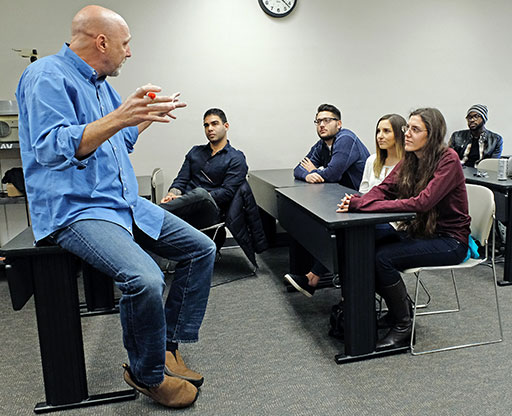Illuminate your perspective and your future with a sociology degree
Imagine peeling back the layers of society, understanding not just the “what” but the “why” behind it all. That’s the power of sociology, the science that unravels the complexities of human relationships, interactions and institutions.
At the University of Missouri–St. Louis, you can earn a sociology degree grounded in experiential learning and scholarly research, which will help you understand sociological changes in the real world.
When you major in sociology at UMSL, you can customize your degree by choosing between a BS or BA. Both paths serve as excellent preparation for advanced studies in sociology or for positions in business, social service and government.
Use your bachelor’s in sociology to understand how society shapes us. With cutting-edge data and in-depth interviews, you’ll uncover the forces that drive change in our world.
Expand your sociology degree with optional tracks
Dive deeper into your specific interests at UMSL. Combine the breadth of a bachelor’s in sociology with the targeted expertise of an optional track that aligns with your minor:
- Urban Studies: Explore the complexities of city life, social inequality and urban planning.
- Health and Aging: Examine the social factors influencing health, illness and aging populations.
- Gender Studies: Dig into the social construction of gender, sex roles and social movements.
- Veterans Studies: Investigate the social experiences of veterans, military families and the transition to civilian life.
Program type:
Major, BA or BS
Format:
On-Campus
Take the next step
Request more information below:

Why earn your sociology degree at UMSL?
A bachelor’s in sociology from UMSL goes beyond textbooks and lectures. We offer a unique and enriching experience that prepares you for success. You’ll enjoy:
- Renowned faculty. Our accomplished faculty are at the forefront of their fields, with professors like Dr. Larry Irons leading groundbreaking research and Dr. Rachel Craft collaborating across disciplines.
- Supportive advising. Our personalized advising program guarantees you meet with a faculty advisor every year to discuss your academic path, career goals and graduate school options.
- Real-world application. Many classes incorporate community-engaged scholarship, allowing you to apply your sociological knowledge to tackle issues related to inequality, social justice and more.
What can you do with a bachelor’s in sociology?
Sociology isn’t just about studying society. It’s about understanding it and using that knowledge to make a positive impact.
At UMSL, our bachelor’s in sociology equips you with the skills and critical thinking to tackle real-world challenges across a diverse range of careers. Through community-engaged teaching, research and service, you’ll develop your communication, cultural competency, critical thinking and leadership abilities — all highly sought-after skills in today’s job market.
Our sociology degree prepares you for success with real-world experience in pressing social issues like inequality, social justice, globalization, public policy, deviance and crime, environment and more.
Earn your sociology degree with a focus that aligns with your interests:
- BA in Sociology: Sharpen your communication skills through interviews, examine personal narratives and gain valuable experience through community engagement — all to paint a rich picture of social life.
- BS in Sociology: Unleash the power of data. This track equips you with the skills to analyze surveys, statistics and data, honing your expertise in uncovering hidden patterns and trends.
Whichever path you pursue, you’ll enjoy broad career opportunities in social service, counseling, administration, marketing, public relations, IT, education, research and more.
Sociologist jobs are projected to grow up to 5% by 2032, with a median annual salary of $101,770, according to wage and employment data from the U.S. Bureau of Labor Statistics.
101,770
5
Career Opportunities
- Adminstrative officer
- Business operations lead
- Community organization director
- Ethnologist
- Human resources manager
- Labor relations specialist
- Medical sociologist
- Personnel manager
- Public survey worker
- Research sociologist
- Social welfare sorker
- Statistician
- Urban planner
Plan of study
BA Option
Bachelor of Arts Requirements and Four-Year Plan
Review Full Degree Requirements Review Sample Four-Year Plan
BS Option
Bachelor of Science Requirements and Four-Year Plan
Review Full Degree Requirements Review Sample Four-Year Plan
All majors must meet the general education requirements of the university in addition to completing degree-specific curriculum requirements.
Non-Missouri Residents: Prospective students are responsible for reviewing the UMSL state authorizations page to see if this program is offered in their state throughout their program and to review the licensure or certification requirements for the state in which they reside.
Student organizations
Make new friends and learn new skills by joining one of our Recognized Student Organizations. Here are several opportunities you may be interested in as a sociology major:
- Student Government Association
- Students of the University of Missouri
Honors College
The UMSL Honors College is a certificate program that can be paired with any major without adding extra classes or extending time to graduate. Classes in the Honors College are seminar-style, meaning that they are based in reading, writing, discussion, and critical thinking. This unique class format fosters an intellectual climate centered around democracy, civility and academic excellence.
Undergraduate research
We encourage and support students as they engage in exciting activities in and outside of the classroom that enrich their academic and professional understanding of their chosen area of study. All majors are encouraged to participate in Undergraduate Research and Scholarship to produce discipline-specific intellectual or creative innovations to their field.








